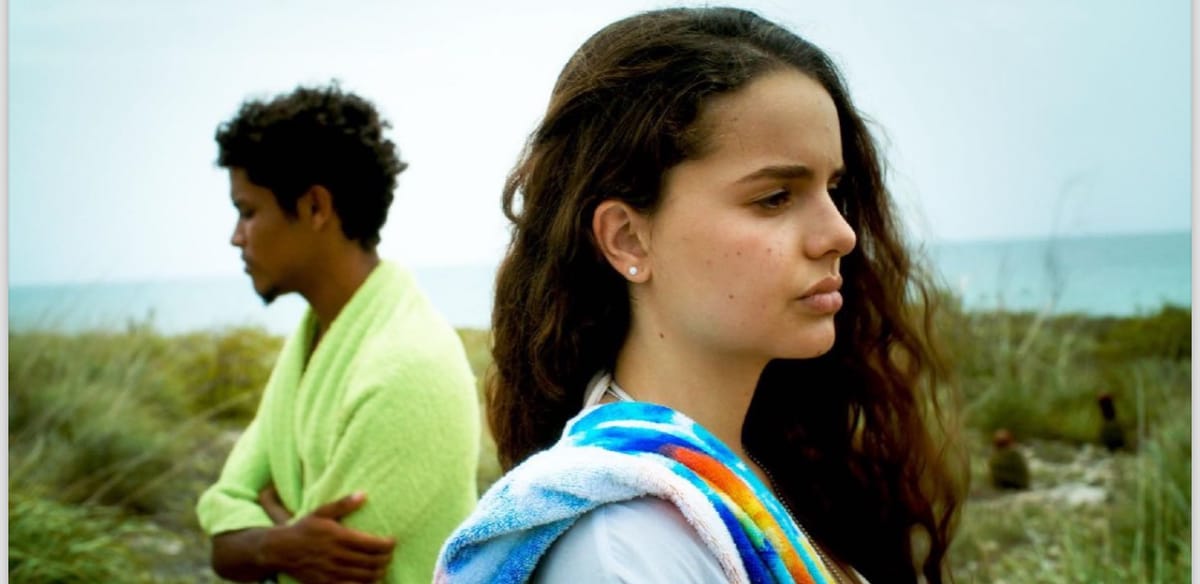Esta Isla is A Grueling Love Letter to Puerto Rico | OBSCURAE at TriBeCa
Esta Isla films in the dialect of Tropical Realism, austere and surreal, a bit verité: it makes no attempts at hiding because it holds itself plain to see.

Dreaming of Blue; Esta Isla is A Grueling Love Letter to Puerto Rico
Adolescence is marked by many firsts: the first crush, the first love, that first heartbreak, that first dream irreparably destroyed by reality. The very height of it is in the feeling of lifting into the air, troubles of land far, far away despite land being what grounds and tethers us together. But for the teenage characters of Esta Isla—on the cusp of everything—land is never that far behind them. For them love, and survival, are inescapably tied to a Puerto Rican national identity that's been ravaged by colonialism. In a time of pronounced political pressure against Latin American and Caribbean communities, it’s a privilege to watch a film like this, and a fateful reminder of the privilege we have as audience members consuming these circumstances as freely as we do.
Bebo (Zion Ortiz) is a working class teen barely surviving in his coastal side of Puerto Rico. Lola (Fabiola Brown) is a wealthy girl straining against her own type of pressures in life. It's sort of a Romeo and Juliet thing; star crossed, impulsive, but with the wake of a horrific murder, the two are set on a journey deep in the wilderness and its lush history. The couple fight to survive their pursuers and the realities that they wish to leave. As lived in cityside turns to beautiful foliage and steep mountain tops, Bebo must contend with whether going back is even a possibility anymore, or if he's fated to sink with the ocean that once sustained their people.
At 114 minutes, Esta Isla could be a tiresome watch but its empathetic content is shot so gorgeously a complaint like that doesn't even register. Cinematographer Cedric Cheung-Lau brings out warmth with a four dimensional touch—the mosquitos swing out of the screen, the sun is real and blisteringly so, the air is humid, salty as the water, sweet like alcohol at karaoke, and wafting with the horse manure from Bebo’s job at the stables. Puerto Rico is marvelously envisioned through the lens of arthouse cinema, visually cultivated on the mystique of a dream that's out of reach. As the weather turns, Bebo and Lola’s trek goes a little more frantic, crisp, and it's challenged by a natural world where reality is unshakable and dreams are unrequited. Directing team Lorraine Jones Molina and Cristian Carretero don't labor in over explaining the point: wisely they let the film marinate with the subtexts and complex truths it occupies. Most centrally, it's of the contrast between a Puerto Rico of the past, vivid and alive, and the deadened version Western expats make of it, who aren't shown but their influence is keenly felt.
“They want a Puerto Rico without Puerto Ricans.” says Lola, maybe Esta Isla's most explicit statement on the subject, but it's so much more interesting how the film conveys that tension formally than it could otherwise. The crunch of the United States on the soil is largely unseen, yet it’s present in the way that water is so scarce though it surrounds the film; in the curvatures of rocky formations; or in the bullets that sling out of a hitman's gun. The film doesn't explain, it embodies the perils of imperial powers and the ways the people under work to circumvent it in their everyday lives. Esta Isla films in the dialect of Tropical Realism, austere and surreal, and a little bit verité: it makes no attempts at hiding because it holds itself plain to see. That sensitivity is its beauty. At its core it’s a revenge story. At its heart it’s a parable of passions, vices that wash ashore, of the memories that live on beyond us, beyond time, across this land forever.



